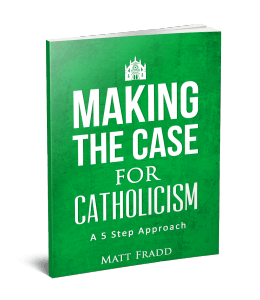Matt Fradd's Blog, page 50
April 26, 2016
The Very Last Letter of St. Maximilian Kolbe
 On the 15th of June, 1941—just under two months from his execution—St. Maximilian Kolbe wrote the following letter to his Mother from Auschwitz.
On the 15th of June, 1941—just under two months from his execution—St. Maximilian Kolbe wrote the following letter to his Mother from Auschwitz.
It’s the last letter preserved (by his Mother, Maria Kolbe) that came from his hand:
“My dearest Mom,
Towards the end of the month of May I reached the concentration camp of Auschwitz (Oswiecim) by rail convoy.
Everything is going well with me. Beloved Mom, don’t worry about me or about my health, because the good God is everywhere and with immense love he thinks about all of us and about everything. It would be best not to write to me u nil I send you another letter. I don’t know how long I shall remain here.
with heartfelt Greetings and a Kiss.”
April 22, 2016
How Modern Neuroscience is Supporting Stein’s Account of Empathy

Edith Stein
Edith Stein’s first major philosophical work, On the Problem of Empathy, raises some fascinating questions about how we know, not only that other minds exist, but that they, like me, are capable of various psychological states and experiences.
Emotional States of Others
The commonsensical view is that we know how others feel based on inference: I am aware of my own thoughts and feelings directly and that these I sometimes express bodily. And while I am not aware of the thoughts and feelings of others, just their outward bodily movements, I can infer by analogy, from the bodily movements, facial expressions, etc. of others, that they, like me, are persons with thoughts and feelings that find expression in bodily movement.
This is a popular response as to how we come to know the emotional state of others. But it isn’t Stein’s.
Stein says that, when we encounter a person who is elated, or grieving, that what is given to us is not an object but a person. A person who is elated or grieving. And in this experience we . . . are you ready? . . . feel their elation or grief. Yep, it’s as spooky as it sounds.
Mirror Neurons
Well here’s the cool thing. Modern neuroscience is supporting Stein’s understanding of empathy. How? Mirror neurons.
Over the last decade neuroscientists have discovered and have been learning more and more about what they call mirror neurons. Simply put, mirror neurons respond to actions that we observe in others. In the 90’s, neurophysiologists hooked a macaque monkey up to a brain scanner to study the neurons specialized for the control of hand and mouth actions. They discovered that the same group of neurons that fired when the monkey picked up the food also fired, though to a lesser extent, when the monkey saw someone else pick it up. In other words, when the monkey performed the action and when the monkey saw the action being performed, his brain reacted in almost the same way.
What does this have to do with empathy?
Neuroscientist Marco Lacoboni writes, “Mirror neurons are the only brain cells we know of that seem specialized to code the actions of other people and also our own actions. They are obviously essential brain cells for social interactions. Without them, we would likely be blind to the actions, intentions and emotions of other people” [source]
So, keeping in mind what I’ve just shared about Stein’s understanding of empathy, listen to what Lacoboni has to say about mirror neurons:
“When you see me perform an action—such as picking up a baseball—you automatically simulate the action in your own brain. …Circuits in your brain, which we do not yet entirely understand, inhibit you from moving while you simulate. … But you understand my action because you have in your brain a template for that action based on your own movements. … And if you see me choke up, in emotional distress from striking out at home plate, mirror neurons in your brain simulate my distress. You automatically have empathy for me. You know how I feel because you literally feel what I am feeling.” [source]
Cool, huh?
April 13, 2016
Was Jesus Just a Myth?: A Socratic Dialogue
 These dialogues aren’t meant to cover every aspect of, or every objection to, each issue discussed. There’s more that could be said, obviously.
These dialogues aren’t meant to cover every aspect of, or every objection to, each issue discussed. There’s more that could be said, obviously.
Instead, they’re meant to be a fun and intellectually stimulating introduction to Christian beliefs that can sometimes be hard to understand.
Also, I’ve tried to make it a reasonably fair exchange between AJ (the atheist) and Lucy (the Christian), but I haven’t tried that hard.
The goal here is to demonstrate the superiority of the Christian position, something that couldn’t be done in the space I’ve done it in if I were to launch every skeptical objection to the issues discussed.
Cool? I don’t think atheists are cotton-headed ninny muggins’s. Promise.
Enjoy, and please give me your feedback below
AJ: Even if you could convince me God exists, you’d still have to prove that your Jesus—and not Zeus, Osiris, or the flying spaghetti monster—is God.
Lucy: That’s right. But one step at a time. What would you think of someone who tried to explain advanced algebra to someone who denied basic arithmetic?
AJ: Atheists are too stupid to handle an argument for Jesus?
Lucy: That’s not at all what I meant. But way to be defensive!
AJ: Might it be that you’re avoiding the question because you know it’s a lot easier to trot out a syllogism for a first cause than to make the case for Jesus’ divinity?
Lucy: I’m going to stick with the reason I gave. Trying to explain the hypostatic union, for example, to an atheist is like trying to teach someone, as I said, algebra who denies basic arithmetic.
AJ: But if Jesus is who you say he is, why don’t you argue for that? If you’re successful and convince me that Jesus is God, it would follow, obviously, that God exists after all! Two birds with one stone.
The Trilemma
Lucy: Fine. We can talk about that. The Jesus we encounter in the New Testament made some radical claims about himself. When we consider these claims I think we have three options: 1) He’s either a liar . . .
AJ: Oh, dear.
Lucy: Rude!
AJ: He’s either a liar, a lunatic or the Lord. I can’t believe you’re trotting that old argument out.
Lucy: Why does the validity of an argument have to do with how long it’s been around?
AJ: It doesn’t
Lucy: All men are mortal. Socrates was a man . . .
AJ: Okay, it’s not that it’s old, it’s that it doesn’t work.
Lucy: Show me how.
Fourth Alternative: Jesus Never Existed
AJ: Here’s the main problem I see with Lewis’ argument. His trilemma is a false one. There’s another option. Maybe Jesus never existed, or, if he did exist, perhaps so much legend had built up around him that we can’t trust the gospels. If that’s true, then the argument falls apart.
Lucy: Okay. That’s a fair point. Then what about this. If Jesus is not the Lord, as I think the New Testament clearly shows, we have three options:
He was a liar, a religious fraud who knowingly made false claims.
He was a lunatic, someone who was sincere but deluded.
He was a mere legend and didn’t exist at all.
AJ: . . .
Lucy: AJ?
AJ: I’m thinking. Let me get a pen. Okay. I’m okay with this. Those do look like the only options. But, you’re presuming something that I’m not convinced of.
Lucy: What’s that?
Jesus Claimed to be Divine?
AJ: That Jesus actually claimed to be God. Or that, as you say, the New Testament “clearly shows” he’s God. If that’s true. And if you can show me that the New Testament is reliable, then I’ll agree we have two options left. That he’s a liar, or that he’s insane.
Lucy: Well, let’s take a look at a few of the passages where Jesus claims to be more than just a wise teacher, more than human. In Matthew 11:27 Jesus claims to have an absolute and unique relationship with the Father. He says, “All things have been delivered to me by my Father; and no one knows the Son except the Father, and no one knows the Father except the Son and any one to whom the Son chooses to reveal him.”
In John 8:58 he says, “Truly, truly, I say to you, before Abraham was, I am.” Not only does he claim to have lived before Abraham, who lived thousands of years before him, but he attributes to himself the divine name, I AM. What do the Jewish leaders do in response? Try to stone him. They knew exactly what he meant.
AJ: Anything else?
Lucy: So much more. We don’t have time to get into all of them if you want to look at those three options we spoke about. So what would you like to do. Focus on this point, or move on? I have to get to class in about an hour and a half.
AJ: Okay, well let’s move to those three options then. Perhaps Jesus never existed, or, if he did and claimed to be God the only other two options are 1) he’s a liar or 2) insane.
The Reliability of the New Testament
Lucy: Let’s talk first about the reliability of the New Testament.
AJ: Fine.
Lucy: The New Testament was written within the first generation after the death of Christ, while the eye witnesses were still alive. We therefore have better sources for Jesus than we do for most of the major figures of history. Our earliest biographies of Alexander the Great were written by Arrian and Plutarch, 400 years after his death, but historians don’t doubt that Alexander the Great existed or that we have a basic knowledge of his life.
AJ: You’ve done your home work!
Lucy: I’m a theology major.
AJ: Oh, are you minoring in unemployment?
Lucy: Not as long as there are people like you to convert.
AJ: Hashtag Burn! You talk about Alexander the Great and others who historians accept as having actually lived, but the difference between those people and your Jesus is that they didn’t claim to be God! Maybe little evidence is sufficient to establish their historicity, but much more is needed to establish some carpenter dude who apparently raised the dead.
Lucy: We’re not yet asking the question, was Jesus God? We’re simply considering whether the New Testament is basically reliable. Perhaps it’s reliable and wrong! Right? But one step at a time. Another thing worth taking into account is that the New Testament documents are better attested than any other works of antiquity.
AJ: Better attested?
Lucy: We have them early, and we have more of them than any other ancient work. For example, we have five hundred manuscripts that are dated earlier than a.d. 500. The next best attested ancient text we have is Homer’s epic poem The Iliad, of which we have only fifty copies that date within 500 years of its origin. And the multiplicity of New Testament manuscripts that we have enable us to check them against each other and ensure that they have been reliably transmitted to us, with very few variant readings. This means that they reliably communicate their original message and are not a conglomeration of legends that built up slowly over time.
Non-Biblical References to Jesus
AJ: That’s a lot of information. Of course the thing is these authors were religiously motivated, right? What about sources outside the Bible? Anything?
Lucy: You’re right, that is a lot of information, and you dismissing it with a “but that’s the Bible” is just arrogant, honestly.
AJ: Arrogant huh?
Lucy: And pig headed. Look, every historian is motivated by something, every historian wrote from a particular point of view. Think about Jewish historians, right? When they write about the Holocaust, they have a point they’re trying to make—and to defend against neo-Nazis who are equally as passionate on their take on what happened—But to dismiss their work as unhistorical because they’re biased would be simply unfair. Similarly, to dismiss the authors of the New Testament because they were trying to convey something they were convinced about is just to display an unfair prejudice against the New Testament.
AJ: Okay, fair enough then. But is that a no? Did non-Christians write about Jesus around the first and second century?
Lucy: Yes, as a matter of fact. You can read about Jesus of Nazareth, Pontius Pilate, and even John the Baptist from non-Biblical sources of the period, such as the writings of the Jewish historian Flavius Josephus (AD 37-c. 100). Other early authors who make reference to Jesus and the early Christian community include the Roman official Pliny the Younger (AD 61 – c. AD 112) and the Roman historians Tacitus (AD 56 – AD 117), and Suetonius (AD c. 69 –c. 122).
AJ: Wow. Okay. didn’t know that.
Lucy: Look at you admitting you didn’t know something. I’m impressed.
AJ: Like I keep telling you, Lucy, I’m an open-minded guy. Okay. Another question for you. Let’s say you’re right.
Lucy: Done.
The Witness of the Apostles
AJ: Not finished. Let’s say you’re right about Jesus claiming to be God and the New Testament documents being reliable. Still it could be false, right? I mean, I’m a Green Lantern fan. See this graphic novel? I can give you an air-tight argument for how it came about, why we have good reasons for thinking the text hasn’t been changed since it was first penned . . . but it’s not true. Hal Jordan is a fictional character. Maybe the apostles started spreading the story of this Jesus because they had nothing better to do. Maybe this explain why other non-Christian historians heard about him and mistakenly believed that he actually existed.
Lucy: Why would the apostles, or anyone for that matter, make up a story like this. You’ve already said boredom—which I think’s a little insulting, but that’s okay. What else?
AJ: They wanted power! They wanted people to listen to them; fame, riches, the typical stuff.
Lucy: Yeah, see the problem with this is that when you read about the first followers of Jesus in the New Testament, you read about people who were weak, stupid, and cowardly. The chief apostle get’s called Satan (Mt. 16:23); they constantly misunderstood Jesus (eg. Jn 4:31-34); they all abandoned him when he was arrested and crucified (Mk 14:50). Hardly what you’d expect them to convey if they were after power and fame.
Further more, to say the apostles made up the story of Jesus’ life, death, and resurrection, you must also be willing to say that they endured horribly painful deaths, including being flayed alive, crucified, stoned, and beheaded for what they knew to be a myth.
These, and many other reasons, make it clear why, according to eminent historian Michael Grant, “no serious scholar has ventured to postulate the non-historicity of Jesus’—or at any rate very few, and they have not succeeded in disposing of the much stronger, indeed very abundant, evidence to the contrary.”
AJ: Okay, let’s say you’re right. Let’s say the New Testament is reliable, and Jesus did claim to be God. Show me why he wasn’t a liar or insane. Those are the only options left, right? And honestly, both sound more plausible than what you believe.
Lucy: Unfortunately I have to run. Same time tomorrow?
AJ: see you then.
April 11, 2016
God or Atheism: What To Do When You Can’t Decide
 If you’d like my new ebook, God or Atheism: What To Do When You Can’t Decide, Click Here
If you’d like my new ebook, God or Atheism: What To Do When You Can’t Decide, Click Here
Every now and then, especially after I’ve given a presentation on the existence of God, I’ll encounter someone who tells me that they’re struggling to believe that God exists. They want to believe that he does, but they find the arguments for his existence equal to the arguments for atheism.
This e-mail I received recently sums up the sort of predicament I’m referring to.
“I started doubting my Christian convictions several months ago, and intellectually feel as though I have lost my faith completely. I do not want to be an atheist although in my private thoughts I’ve even started self-identifying as a nonbeliever. I need help. I’m very advanced in the area of apologetics and know most of the point-counterpoint chess moves of secular/theist dialog. Do you have any practical advice for someone going through this?” – Rob
When I get these e-mails, or chat with these people after an event, I try to provide some helpful resources for whatever particular challenge the person is facing. Other times, I help them come to terms with what faith is (trust in a God we don’t always understand) and what it is not (a blind leap in the dark against of all available evidence).
And sometimes I’ll draw upon a reason to believe in God that comes from the seventeenth-century French mathematician and philosopher Blaise Pascal—a reason that is now known as Pascal’s Wager.
To Learn more about Pascal’s Wager and how to respond to common objections to it, download my new ebook by clicking here.
March 23, 2016
3 Reasons to Start Praying the Jesus Prayer
I recently bought a Orthodox prayer rope and have started praying the Jesus Prayer. I’ve been praying it every day for about a month now and through it am discovering a new-found intimacy with our Lord.
In this blog I will explain what the Jesus Prayer is and then offer 3 reasons you should consider incorporating it into your spiritual life.
The Jesus Prayer (sometimes called the Prayer of the Heart or the Prayer of a Single Thought) involves repeating the simple mantra, “Lord Jesus Christ, Son of God, have mercy on me.” This is done often with the aid of a prayer rope. I bought mine here, but of course you could just use regular rosary beads. Oh, and those different colored beads that you see on the rope are just to track how many times you’ve said the prayer. They don’t indicate, as they do on the rosary, that a different prayer is to be said.
The History of the Prayer
The history of the Jesus Prayer goes back, as far as we know, to the early fifth or sixth century, with Diadochos of Photiki, who taught that repetition of the prayer leads to inner stillness. In his work, A Century on Spiritual Knowledge and Discrimination, he wrote:
“Grace at first conceals its presence in those who have been baptized, waiting to see which way the soul inclines, but when the whole man has turned towards the Lord, it then reveals to the heart its presence and there, with the feeling which words cannot express, if then a man begins to make progress in keeping the commandments and calls ceaselessly upon the Lord Jesus, the fire of God’s grace spreads even to the heart’s most outward organs of perception, consciously burning up the tares in the field of the soul.” (85)
Just an Eastern Thing?
I know what some of you are thinking: But isn’t this just an eastern thing? Are we allowed to pray it as Catholics? Think about that for a second. You’re asking, “am I allowed to repeat as a prayer, ‘Lord Jesus Christ, Son of God, have mercy on me'”? Seriously?  Yes.
Yes.
If you want to read what the Catechism of the Catholic Church has to say about this practice, jump down to the end.
3 Reasons to Pray the Jesus Prayer
I have taken the following 3 reasons from a page on St.Vladamir’s Orthodox Theological Seminary website and have adapted them with some of my own thoughts.
1. In order to pray always!
St. Paul calls us to pray without ceasing 1 Thess 5:17. The real questions is, how. The Jesus Prayer provides one good way to pray constantly. Our task is to draw nearer to God. St. Isaac of Syria says that it is impossible to draw near to God by any means other than increasing prayer.
2. Silence
Our lives are filled with noise: podcasts, children, traffic, chatter; even social media and texting is noisy in the sense that it distracts and interrupts us. the Jesus Prayer enables us to spend 15 or so minutes in stillness. It overrides our usual compulsive stream of consciousness about our own anxieties. Beginning with this form of prayer, then we might be led to deeper inner stillness, prayer without words. The caution here is that prayer without words is not heaviness, semi-sleep dullness. Rather, wordless prayer is alive, vigorous God-awareness.
3. Contemplation
Contemplation has been described as clear awareness without words. Contemplation is a “seeing clearly.” We lay aside thoughts, not to lead to a vacuum or drowsiness, but to inner plenitude. We deny to affirm. Wordless contemplation is not an absence, but a presence, a God-awareness. The aim is to bring us into a direct meeting with a personal God, on God’s terms.
What the Catechism Says
The name of Jesus “is the only one that contains the presence it signifies. Jesus is the Risen One, and whoever invokes the name of Jesus is welcoming the Son of God who loved him and who gave himself up for him.
This simple invocation of faith developed in the tradition of prayer under many forms in East and West. The most usual formulation, transmitted by the spiritual writers of the Sinai, Syria, and Mt. Athos, is the invocation, “Lord Jesus Christ, Son of God, have mercy on us sinners.” It combines the Christological hymn of Philippians 2:6-11 with the cry of the publican and the blind men begging for light. By it the heart is opened to human wretchedness and the Savior’s mercy.
The invocation of the holy name of Jesus is the simplest way of praying always. When the holy name is repeated often by a humbly attentive heart, the prayer is not lost by heaping up empty phrases, but holds fast to the word and “brings forth fruit with patience.” This prayer is possible “at all times” because it is not one occupation among others but the only occupation: that of loving God, which animates and transfigures every action in Christ Jesus” (2666-8).
Here’s a helpful explanation of the Jesus Prayer by John Michael Talbot:
March 14, 2016
What Does the Church Teach About Tattoos?
I was recently asked:
Could you please explain to me rationally without using [complex] words, and yet using theology, and convince me why I shouldn’t get a tattoo? There’s too much mumbo jumbo on the internet and I would truly appreciate finding something concrete and understandable.
I’m afraid that I cannot explain—either with simple, or complex words—why you shouldn’t get a tattoo.
The reason being that, in principle, the Church does not oppose tattoos.
PS, if you’d rather hear what I have to say (instead of reading—boring! #AmIRight), listen here:
. . . Or, continue reading!
Ceremonial Law vs. Moral Law
Sometimes people point to the passage in Leviticus which says, “Do not . . . put tattoo marks on yourselves. I am the Lord” (19:28).
But this verse is not binding upon Christians for the same reason that the verse, “nor shall there come upon you a garment of cloth made of two kinds of stuff” (Lev. 19:19), is not binding upon Christians. Namely, it is a part of the ceremonial law which was binding upon the Jewish people, but which is not binding upon Christians (except for when it coincides with the moral law).
The author of Hebrews writes:
Now if perfection had been attainable through the Levit’ical priesthood (for under it the people received the law), what further need would there have been for another priest to arise after the order of Melchiz’edek, rather than one named after the order of Aaron? For when there is a change in the priesthood, there is necessarily a change in the law as well (11-12).
Similarly, St. Irenaeus of Lyon wrote, “The laws of bondage, however, were one by one promulgated to the people by Moses, suited for their instruction or for their punishment, as Moses himself declared: “And the Lord commanded me at that time to teach you statutes and judgments.” (Deut. 4:14) These things, therefore, which were given for bondage, and for a sign to them, He cancelled by the new covenant of liberty (Against Heresies IV.16.5).
To Tattoo, or not to Tattoo
So, is the prohibition against tattoos in Leviticus a part of the moral law?
My colleague, Jimmy Akin says no:
There is no reason why one cannot color one’s skin, which is what tattooing amounts to.
One can apply color to one’s skin by make-up (as is common among women), magic markers (as is common among children), press-on tattoos (as are common in Crackerjack boxes), or with real tattoos.
The mere fact that the ink goes into the skin in the latter case does not create a fundamental moral difference.
But if you do decide to get a tattoo, consider the following:
1. The images should not be immoral, such as sexually explicit, satanic, or in anyway opposed to the truths and teachings of Christianity.
2. Be prudent. While “mom” is probably a safe bet; tattooing your current girlfriend’s name on your arm probably isn’t.
3. Consider the arguments against tattooing (there’s bound to be a good website out there devoted to that). Just because the Church doesn’t say you mustn’t get one, doesn’t mean that you must! Consider the following question: Would you put a bumper sticker on a ferrai?
The advice I gave to my sister when she was considering a tattoo was to give it several months. If you still feel strongly about the tattoo you had in mind after that time, then maybe get it. If, during that time, you changed your mind about the type of tattoo you wanted, or where to get it, perhaps wait another several months before getting it.
Download My New Ebook on Apologetics for Free!
 I just created a little ebook (Click Here to enter your email and BAM, I’ll send it to you) to help people evangelize and apologize (as in “apologetics,” not, “I’m so sorry I’m Catholic!”).
I just created a little ebook (Click Here to enter your email and BAM, I’ll send it to you) to help people evangelize and apologize (as in “apologetics,” not, “I’m so sorry I’m Catholic!”).
It seems to me that building a case for the Faith is a lot like building a house, a mansion, one floor at a time.
Those outside the mansion, in the thought experiment, would be atheists; those on the first floor, theists who believe in a generic god; those on the second floor, theists who believe in the Christian God; and finally those on the third floor would be theists who believe in the Christian God and the truth claims of the Catholic Church.
Our goal as Catholic apologists is to lead others out of the darkness of unbelief to the summit of the mansion, the Catholic Church, which contains the fullness of truth.
This ebook will help you do that more effectively.
Hope you enjoy!
February 10, 2016
A Creative Way To Give Up Porn This Lent (and Afterwards!)
 Giving up sin is something we should be doing anyway, right? That said, setting yourself a goal you know you can reach is usually far more effective than merely saying “I’ll never do this again”
Giving up sin is something we should be doing anyway, right? That said, setting yourself a goal you know you can reach is usually far more effective than merely saying “I’ll never do this again”
So, here’s an interesting way you and a friend might decide to give up porn for Lent (and beyond). It’s called Blue Label Challenge.
The site says this:
You challenge a friend to a no-porn/masturbation contest. Whoever caves first buys the winner something awesome.
STEP 1: Choose a prize you both agree on (book, dinner, scotch, etc.).
STEP 2: Agree with your friend that both of you will be 100% honest and that lying is lame.
Those who sign up will get free private monthly videos of two guys drinking scotch and talking about how to overcome porn.
I think this is awesome for at least two reasons: 1. It encourages accountability between two people which is essential when trying to overcome porn, and 2. It helps people realize that their actions have consequences (even if that consequence is buying your friend a bottle of scotch, or, donating to a women’s shelter).
What do you think?
Sign up here.
February 4, 2016
3 Reasons You Need To Get This Book!
Thanks to Catholic Answers, my wife and I are able to sell our new book for wives for as low as $2 a book. Read on and you’ll learn why you or someone you love needs it.
 There are resources for men who struggle with porn; resources for women who struggle with porn. There are even resources for parents to help their kids not struggle with porn.
There are resources for men who struggle with porn; resources for women who struggle with porn. There are even resources for parents to help their kids not struggle with porn.
But what’s out there for wives? Don’t get me wrong, there are some fantastic things out there (see here, here, and here), but can you name, say, five? Three? Two?
This is a problem!
Usually after I have given a presentation on pornography, I meet more than one wife whose husband looks at porn. The first thing she asks me is, “what can I do about him?”
This question bothers me not because it isn’t valid, but because I know this woman needs to be asking a prior question that may not have even occurred to her—how do I heal? What can be done to help me with the trauma I’m experiencing?
This new book, Restored: True Stories of Love and Trust After Porn, was written and edited by my wife, Cameron, and me and it’s phenomenal.
I can say that without pride because within this book are 10 beautifully raw and honest accounts of real women and couples whose lives were shattered by porn’s destructive effects.
But because God’s grace is stronger, they were able to find healing and hope, trust renewed, and intimacy Restored.
3 Reasons to Get the Book!
So, if you’ve found what I’ve said until now unpersuasive, here are 3 reasons, from three very awesome women, why you should get Restored.
1. “While hard to read, Restored is an important resource for women to know that they are not alone. It is a powerful testament that there is hope for their marriage and hope for conversion. Every wife who has had to deal with pornography in her marriage should read this book.”
2. “Countless women feel trapped by their partner’s pornography use, and feel ashamed and alone in their struggles. Through the raw and honest testimonies contained in Restored, readers will discover that it’s possible to break through the silence and find hope, healing, and encouragement.”
– Crystalina Evert, Chastity Project
3. “For years, I have listened to stories of pornography tearing apart relationships and marriages. Restored captures those voices of pain and trial, but also reveals the beauty of forgiveness, love, and mercy – the mercy shown from one human heart to another and the bountiful mercy of our God. Thank you, Matt and Cameron for this great gift to our Church.”
– Sarah Swafford, Emotional Virtue Ministries
Read more reviews here.
Read a free chapter of the book here.
February 2, 2016
Are Sunday’s a Part of Lent? Yes. Here’s Why

Next Wednesday is the start of Lent. Next Wednesday! Madness!
Back when I worked as an apologist with Catholic Answers we received a lot of questions around this time of year. Perhaps the most common was, “are Sunday’s excluded from Lent?”
The answer is . . . are you ready for this?
No. Sunday’s are not excluded from Lent. According to the General Norms for the Liturgical Year and the Calendar, “Lent runs from Ash Wednesday until the Mass of the Lord’s Supper exclusive” (28).
No exceptions are given for Sunday’s during Lent. In fact, a couple of paragraphs later the GN says: “The Sundays of this season are called the First, Second, Third, Fourth, and Fifth Sundays of Lent. The Sixth Sunday, which marks the beginning of Holy Week, is called Passion Sunday (Palm Sunday)” (30).
So there you have it. Now, does that mean that we cannot choose to allow ourselves the things we voluntarily gave up for lent? No, it doesn’t. These voluntary fasts are personal devotions. Because they have been voluntarily taken up, we can choose to set them aside.
That said, be awesome and sacrifice this Lent. What my P.E coach told me in middle-school applies to Lent also, “mate, if it’s not hurting, you’re not doing it right.”
Matt Fradd's Blog
- Matt Fradd's profile
- 168 followers






